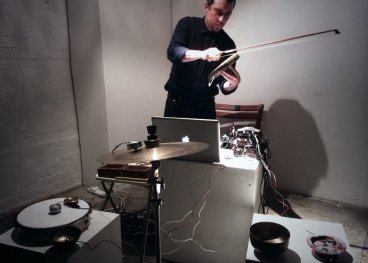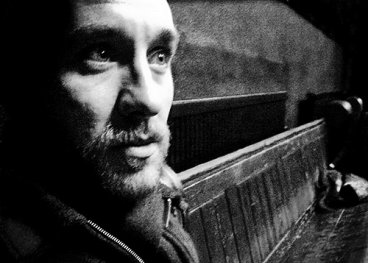Project details
| Project lead | Will Parker & Dr Johny Lamb |
|---|---|
| Start date | September 2022 |
| End date | Ongoing |
| Project website | Post Noise | Instagram |
POST— provides access to collective music-making that wouldn’t be possible in traditional ensembles—allowing numerous participants with varying skill sets to thrive in an accepting and playful environment. It is a convergence of teaching and learning, community engagement and industry. Participants devise their own parts via exercises in listening and improvisation—focusing on how small interactions between players can have a large cumulative effect. The HEIF funding paid students and alumni for their time and gave many their first experience of a commercial release. It also supported local businesses through payment and access to Falmouth’s resources.
- The project aims to address a gap in traditional music theory skills, initially as a way of integrating production students into the arena of ensemble music making. This quickly grew into ways of thinking about workshop exercises, composition and the possibilities of alternative ways of both generating and scoring electronic music for live ensemble performance with different levels of instrumental experience.
- How might techniques, scores and methods from experimental music be applied to teach and enhance music theory and musicianship for people without formal musical training?
- Investigating the convergence between, teaching, research and the experimental music industry.
- Whether it is possible to bridge a skills and knowledge gap through innovative pedagogy as well as explore the recording and release stages of an album in an educational context.
- Strategies for creation, collaboration, community engagement and release.
- Pedagogy and ensemble design.
- The origins of the ensemble are built on a number of musical principles and techniques, which come variously from experimental music and the fringes of popular music. In particular, we draw from John Stevens, Fluxus, La Monte Young, James Tenney, Krautrock/Kosmiche Music and Postrock to develop exercises and to build performances.
- The work is perhaps within the contemporary resurgence of outboard/analogue synthesis that has seen a huge growth in the manufacture of these instruments, and also the partial rejection of software in favour of Eurorack and similar technologies. It is also making a tangible contribution to music pedagogy and its ongoing discourse.
- The research project is aligned with the Innovative and inclusive pedagogy and scholarship theme.
- POST- as part of our undergraduate programme has significant value in teaching, our own compositional output, and knowledge exchange beyond the campus. It has also allowed us the give paid opportunities to undergraduates, and to form a significant part of the ‘collective music making’ culture in AMATA. We have also collaborated with the Dance and Choreography team and students as part of ‘Body &’ events.
- POST- began as part of the ensemble provision of the undergraduate music programme, and by the academic cycle of 2022 we began to think of it as a larger research and knowledge exchange project with a reach well beyond the undergraduate timetable. We made an album of some of the core performance material with participants from all iterations of the ensemble. Through this process we began to formalise the modes of scoring the work, developing a text style of musical and structural directions which will be assembled into a usable text book of POST- scores which will form part of the commercial release. The research is embedded firmly within practice and participation, and methodologically we can constantly evaluate and adapt through our ongoing work with undergraduates. We have extended to running workshops outside the university, and with potential applicants at university open days, which again allows us to make critical evaluations around the clarity and efficacy of our work.
- Key points in the project are the development, recording and production of the album, the external workshop as part of the Electronics Symposium, workshops with potential applicants, and the POST- Body & event which demonstrates a newer version of POST- which can be much smaller, and subsequently much easier to tour or take to more distant venues and/or events.
Project team

Will Parker
Lecturer in Popular Music
Will Parker is a lecturer, researcher and composer specialising in technology and aesthetics - ...

Dr Johny Lamb
Senior Lecturer, Music
Johny is a senior lecturer specialising in the study of popular music. He is a songwriter, composer,...
Additional team members
- Daniel Ledley
- James Scarle
- Robin Tyndale-Biscoe
Partners
Lemonade Factory Studios - mixing and mastering.
Sirens Studios - youth music funded inclusive recording studios.
Difficult Art and Music - record label specialising in research driven art objects and experimental music.
Alumni - Theo Braham, Jess Beechy, Laura Durdey, Daniel Ledley, James Scarle, Christian Wright.
Funders
- HEIF Funding £9556
- In kind technical assistance and room hire £3325
Outputs & outcomes
The project is ongoing and outputs are imminent.
POST— Outputs
The following items are expected to be entered into the REF for the POST— project.
- A digital and physical album release on the DAAM record label supported by MA Music Business.
- Full promo videos for 2 of the tracks on the album.
- A teaching manual of the exercises developed over the last 5 years.
- The workshop and resulting performance at the Electronic Symposium. We have photos and videos of the event. As well as other outreach and community engagement.
- A paper on radical ensemble design and alternative modes of music communication.
POST— KE
- Engagement with community – Fish Factory AHRC funded symposium – participation of AMATA teachers & technicians in the community.
- Employment of local businesses – Sirens Studios, Lemonade Factory Studios, Juko Print.
- Employment of students and alumni as professional musicians.
Impact & recognition
The project is ongoing, and impact and reach is not ascertainable at this stage. However, the 4 short clips posted on the POST— Instagram account @post_noise have 5482 plays (as of 12th march).
